|
|
|
Sort Order |
|
|
|
Items / Page
|
|
|
|
|
|
|
| Srl | Item |
| 1 |
ID:
155201
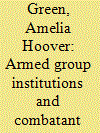

|
|
|
|
|
| Summary/Abstract |
Ex-combatants who fought with the Salvadoran Army during El Salvador’s 1980–92 civil war often recall being ‘captured’, rather than recruited, suffering beatings and humiliation in the course of training, and fighting without a sense of purpose or direction. Those who served with rebel forces, by contrast, recall fatigue and frustration with new routines, but seldom hazing or abuse; most also recalled deep, ongoing instruction about the purpose and goals of the war. This comparison highlights the broad variation in armed groups’ formal institutions for socialization, a topic that political scientists have only recently begun to examine in depth. The Salvadoran case also emphasizes some shortcomings of the existing literature, which may elide the differing effects of different formal institutions, treat individual institutions as operating independently on combatant behavior, and/or fail to map complex causal processes intervening between institutions and behavior. This article takes as its starting point the observation that many armed group institutions – including recruitment, military training, political training, and disciplinary regimes – are components of the process known more generally as ‘combatant socialization’. Examining specific institutional processes associated with combatant socialization allows for the generation of more refined and specific theories of combatant socialization as both a causal variable and an outcome. At the same time, treating armed group institutions as related elements of a broader process, rather than as fully separate institutions, may also advance understandings of the effects of these institutions. I demonstrate that the implementation and content of formal institutions for socialization varied significantly both across and within groups in El Salvador; building on this analysis, I lay out several potential directions for comparative research.
|
|
|
|
|
|
|
|
|
|
|
|
|
|
|
|
| 2 |
ID:
154338
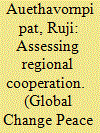

|
|
|
|
|
| Summary/Abstract |
Existing studies of Association of Southeast Asian Nations (ASEAN) states’ engagement with migrant worker rights focus on the experience of such workers from gender, labour and security perspectives. As such, these studies are yet to consider the broader impact of migrant worker rights on the process and nature of cooperation between ASEAN members. This article addresses this gap by framing migrant worker rights within the broader human rights socialization ongoing within Southeast Asia, driven by both members of ASEAN and external stakeholders. It argues that, contrary to many existing accounts of norms as creating shared commitments, migrant worker rights have led to considerable contestation, often driven by diverging national approaches to the issue. This article examines the impact of migrant worker rights norms on Thailand, the largest labour-recipient state in ASEAN. It asserts that Thailand’s diverging experience is caused by the lack of norm precision, resulting in the applicatory contestation of such norms.
|
|
|
|
|
|
|
|
|
|
|
|
|
|
|
|
| 3 |
ID:
153710
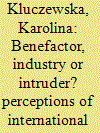

|
|
|
|
|
| Summary/Abstract |
Soon after the breakdown of the Soviet Union in 1991, a civil war started in Tajikistan (1992–97). This was also the period when a number of international organizations arrived in the country to distribute humanitarian assistance and assist in conflict resolution and stabilization. After the UN, the Organization for Security and Co-operation in Europe (OSCE) was the second key organization which appeared in the conflict-stricken country. Like other key international organizations in Tajikistan, the OSCE, which has been in the country since 1994, has seen a shift in its original functions of monitoring and emergency assistance. Some see its avowed objectives in the new century as formalistic, virtual and ineffective. By capturing perceptions of foreign assistance to Tajikistan among employees of the OSCE and other international organizations, NGO workers, government officials and ordinary citizens, this article explores how Tajikistan ‘socialized’ the OSCE, making the organization simultaneously a benefactor, an industry and even an intruder.
|
|
|
|
|
|
|
|
|
|
|
|
|
|
|
|
| 4 |
ID:
155198
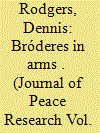

|
|
|
|
|
| Summary/Abstract |
Drawing on longitudinal ethnographic research that has been ongoing since 1996, this article explores the way that gangs socialize individuals into violent norms and practices in Nicaragua. It shows how different types of gang violence can be related to distinct socialization processes and mechanisms, tracing how these dynamically articulate individual agency, group dynamics and contextual circumstances, albeit in ways that change over time. As such, the article highlights how gang socialization is not only a variable multilayered process, but also a very volatile one, which suggests that the socialization of violence and its consequences are not necessarily enduring.
|
|
|
|
|
|
|
|
|
|
|
|
|
|
|
|
| 5 |
ID:
153237
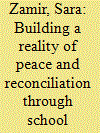

|
|
|
|
|
| Summary/Abstract |
This article shows that effective reconciliation and peace-building require teaching children a constructed narrative based on the opposing stories, especially with regard to an intractable conflict such as the one that characterizes the Israeli–Palestinian case. Textbooks play an important role in any country when it comes to creating collective memory and political consciousness. They change over time, according to political and social powers within that nation, and can support and inspire processes of war or peace education. In a transition period between war and peace, for example, one can distinguish differential trends of texts that convey acceptance, tolerance, minimization of stereotypes and reduction of war imagery compared to the preceding period – all in the service of building a reality of peace and reconciliation.
|
|
|
|
|
|
|
|
|
|
|
|
|
|
|
|
| 6 |
ID:
188640
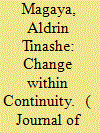

|
|
|
|
|
| Summary/Abstract |
The article examines how a rural community in Bocha, Zimbabwe, molded Christianity to suit and serve its local everyday realities. It highlights the coexistence and interdependence between Christianity and the long-standing Bocha people’s traditions. It contends that although ordinary churchgoers internalized Christian idioms and teachings, they did not give up being the Bocha. In doing so, it highlights how existing ways of socialization, social facts, local beliefs, spiritual needs, and customs shaped the understandings of sacred indigenous and Christian spaces. It argues that an existing pre-Christian tenet of tolerance created the right social environment for religious diversity and the coexistence of indigenous and Christian practices and beliefs. Thus, the article points to the persistence of pre-Christian culture within an increasingly Bocha Christian community in the first half of the twentieth century.
|
|
|
|
|
|
|
|
|
|
|
|
|
|
|
|
| 7 |
ID:
057958
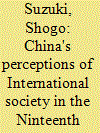

|
|
|
| 8 |
ID:
130581
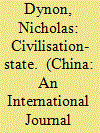

|
|
|
|
|
| Publication |
2014.
|
| Summary/Abstract |
This article analyses the largely overlooked role of the Communist Party of China (CPC) in the promotion of "socialist spiritual civilisation" in contemporising the exemplary role of the Chinese state and in informing the state's efforts to rehabilitate China's cultural traditions. Drawing material from handbooks, newspaper articles and posters published between 1996 and 2002, it may be argued that the ability of the Party to reclaim the achievement of "civilisation" as an ultimate goal in Chinese history has a direct impact on its continuing pursuit to underwrite its long-term legitimacy. This article departs from existing scholarship to locate the CPC's civilising discourses within a historical context that predates the apotheosis of the CPC itself and links them to the sacred mission of maintaining the Chinese civilisation-state.
|
|
|
|
|
|
|
|
|
|
|
|
|
|
|
|
| 9 |
ID:
184199
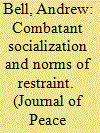

|
|
|
|
|
| Summary/Abstract |
Can armed groups socialize combatants to norms of restraint – in essence, train soldiers to adopt norms of international humanitarian law on the battlefield? How can social scientists accurately measure such socialization? Despite being the central focus of organizational and ideational theories of conflict, studies to date have not engaged in systematic, survey-based examination of this central socialization mechanism theorized to influence military conduct.
This study advances scholarly understanding by providing the first comparative, survey-based examination of combatant socialization to norms of restraint, using surveys and interviews with US Army cadets at the US Military Academy (USMA), Army Reserve Officer Training Corps (ROTC), and active duty Army combatants. Additionally, to better understand ‘restraint’ from combatants’ perspective, this study introduces the concept of the ‘combatant’s trilemma’ under which combatants conceptualize civilian protection as part of a costly trade-off with the values of military advantage and force protection.
Survey results hold both positive and negative implications for socialization to law of war norms: military socialization can shift combatants’ preferences for battlefield conduct. However, intensive norm socialization may be required to shift combatants’ preferences from force protection to civilian protection norms. Study findings hold significant implications for understanding violence against civilians in conflict and for policies to disseminate civilian protection norms in armed groups worldwide.
|
|
|
|
|
|
|
|
|
|
|
|
|
|
|
|
| 10 |
ID:
066874
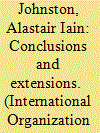

|
|
|
| 11 |
ID:
116682
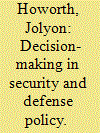

|
|
|
|
|
| Publication |
2012.
|
| Summary/Abstract |
For scholars and practitioners of European politics alike, the distinction between supranationalism and inter-governmentalism has always been fundamental. This distinction has underpinned the various schools of European integration theory, just as it has remained crucial for European governments keen to demonstrate that the Member States remain in charge of key policy areas. Nowhere is this considered to be more central than in the area of foreign and security policy, which has consciously been set within the rigid intergovernmental framework of Pillar Two of the Maastricht Treaty and, under the Lisbon Treaty, remains subject to the unanimity rule. However, scholarship on the major decision-making agencies of the foreign and security policy of the EU suggests that the distinction is not only blurred but increasingly meaningless. This article demonstrates that, in virtually every case, decisions are shaped and even taken by small groups of relatively well-socialized officials in the key committees acting in a mode which is as close to supranational as it is to intergovernmental.
|
|
|
|
|
|
|
|
|
|
|
|
|
|
|
|
| 12 |
ID:
139837
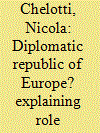

|
|
|
|
|
| Summary/Abstract |
Using an original database of 138 questionnaires, the article explores how national officials perceive their role when participating in European Union (EU) foreign policy committees. It first shows that they systematically assume not only intergovernmental but also supranational role conceptions: a good number of diplomats understand EU foreign policy as a collective political project with the objective to craft a common European policy. The article then investigates some scope conditions. If the overall picture is complex and heterogeneous, it reveals that socializing activities occur in this policy field. More specifically, the number of years spent in Brussels is a relatively strong predictor of a supranational attitude. At the same time, diplomats’ conceptions are formed also outside EU contexts: the structure and the pro-European opinions of the national polity affect the formation of a diplomat’s orientation. Remarkably, member states’ military power is a weak and non-significant variable in all the models tested.
|
|
|
|
|
|
|
|
|
|
|
|
|
|
|
|
| 13 |
ID:
117622


|
|
|
|
|
| Publication |
2012.
|
| Summary/Abstract |
The U.S. Army consists of two distinct functional components: soldiers serving in combat roles, on the one hand, and those who serve in support positions, on the other. Do these two functionally distinct segments differ culturally as well? Empirical researchers utilizing qualitative methods have supported a "Two Armies" concept. This article examines the phenomenon quantitatively by using a nationally representative sample of the active duty population. The authors find that there is a statistically significant difference between support and combat soldiers that holds even after taking into account differing demography. Interestingly, this is true mainly of White soldiers, and the authors find that it is driven by premilitary, civilian socialization. This dataset also clearly shows that, for most soldiers, the split between the two segments of the Army tends to diminish over time, with combat and support soldiers sharing more similar motivations with one another later in their terms of service.
|
|
|
|
|
|
|
|
|
|
|
|
|
|
|
|
| 14 |
ID:
026900
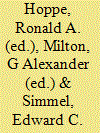

|
|
|
|
|
| Publication |
New York, Academic Press, 1970.
|
| Description |
xi, 220p.
|
|
|
|
|
|
|
|
|
|
|
|
Copies: C:1/I:0,R:0,Q:0
Circulation
| Accession# | Call# | Current Location | Status | Policy | Location |
| 004571 | 303.32/HOP 004571 | Main | On Shelf | General | |
|
|
|
|
| 15 |
ID:
061235
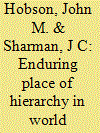

|
|
|
| 16 |
ID:
066875
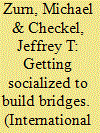

|
|
|
| 17 |
ID:
145067
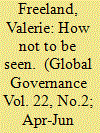

|
|
|
|
|
| Summary/Abstract |
How do we know when a state has been socialized to an international norm? Through a case study of Sierra Leone's Truth and Reconciliation Commission, this article shows that not even voluntary compliance combined with material costs constitutes sufficient evidence of socialization. Highly vulnerable states, equally beholden to international donors and fractious domestic patronage networks, face restricted choice sets. They confront both compliance and overt noncompliance as equal existential threats, and their most important foreign policy goal becomes invisibility; that is, they must avoid attracting international attention. These states behave outwardly like they have accepted the norm's legitimacy, but their actions are rooted in a fundamentally different meaning that blocks socialization and has implications for the state system as a whole.
|
|
|
|
|
|
|
|
|
|
|
|
|
|
|
|
| 18 |
ID:
183866
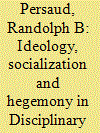

|
|
|
|
|
| Summary/Abstract |
This article argues that Disciplinary International Relations (DIR) does not only explain international affairs, but it also socializes and hegemonizes publics and professionals into an ideological worldview consistent with the interest of states that underwrite the world economic and security order based on hegemonic liberalism. Considerable emphasis is placed on tracing the continuities between the early theorization of IR in the United Kingdom and the United States, and the contemporary academic/foreign policy/security ‘complex’ dedicated to the maintenance of a hegemonic world order. The article demonstrates that the call for a greater theory–policy nexus in international affairs is redundant because leading American scholars double up as policy-makers, either directly or through other avenues such as consultancies. Some of the most prominent IR scholars, such as Michael Doyle, John Lewis Gaddis, Samuel Huntington, G. John Ikenberry, Stephen Krasner, Theodore H. Moran, Joseph Nye and Anne-Marie Slaughter, among others, have served in high-level positions in the United States foreign policy and security apparatus. The article also shows the ways in which in the early days of IR theorizing in the UK, scholars such as Lionel Curtis, Alfred Zimmern and Norman Angell doubled as staunch defenders of the British Empire, albeit in the language of liberal internationalism.
|
|
|
|
|
|
|
|
|
|
|
|
|
|
|
|
| 19 |
ID:
121788
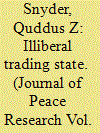

|
|
|
|
|
| Publication |
2013.
|
| Summary/Abstract |
Liberal systemic theory is built on the assumption that the system's dominant configuration is a Kantian confederation of major powers. In addition to being a democratic cluster, the liberal core is also a capitalist club. This article pushes systemic and socialization theory forward by introducing the mechanism of economic competition as an important driver of socialization. The article develops a theory of system-level competition, arguing that it is a distinct and co-equal mechanism of socialization to the established mechanisms of persuasion, inducement, and coercion. The article proposes a three-staged model of socialization that explains how prominent rising powers such as Turkey, India, Brazil, and China are being socialized into the liberal system. At the first phase, competitive pressure, outsiders are led to orient themselves toward the core out of a fear of falling behind and a desire to access network benefits. At the second phase, rushing, outsiders behave in pro-norm ways and make significant concessions in order to gain inclusion in the core's institutional complex. At the third phase, internalization, external norms become embedded in domestic legal institutional structures and a robust pro-norm domestic coalition emerges. The article uses the case of China to illustrate the model and lend it some initial empirical support in one hard case.
|
|
|
|
|
|
|
|
|
|
|
|
|
|
|
|
| 20 |
ID:
109568
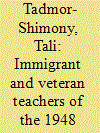

|
|
|
|
|
| Publication |
2011.
|
| Summary/Abstract |
Among Israel's socialization agents during its first years were teachers who were sent off everywhere where there were children of compulsory school age. The majority of the teachers teaching in the periphery lacked pedagogical training. They were recruited by the Ministry of Education owing to the shortage of teachers in the wake of the mass immigration. Among them were immigrant teachers, who were struggling to integrate into the society, and young teachers of the 1948 generation, including novice teachers and soldier teachers. These two groups were expected not merely to teach, but also to fulfill various specialist functions in their contact with their pupils' families, struggling with problems typical of immigrants. This article examines their biographical profile affecting their activity and indicates that teaching in the periphery empowered the young teachers, while enabling the immigrant teachers to join the middle class of veteran Israelis within a relatively short time.
|
|
|
|
|
|
|
|
|
|
|
|
|
|
|
|
|
|
|
|
|